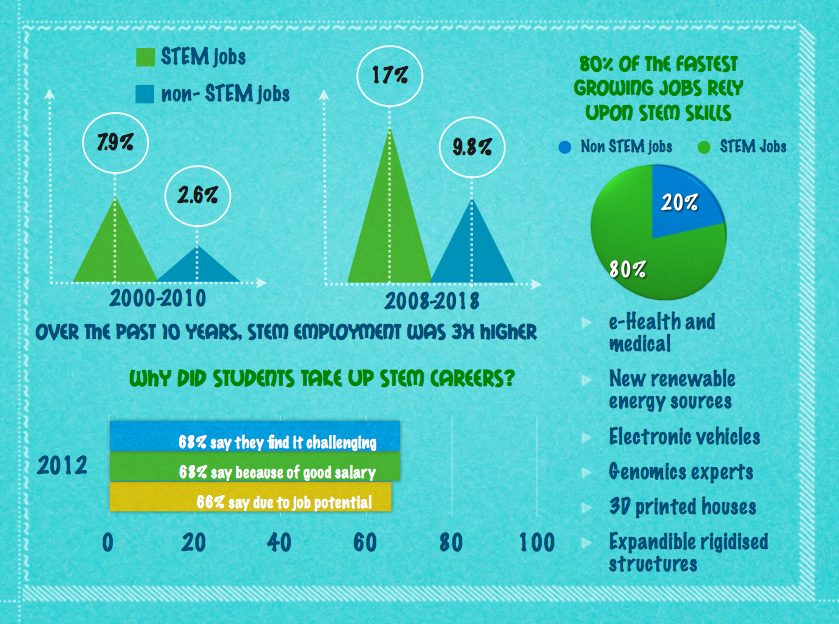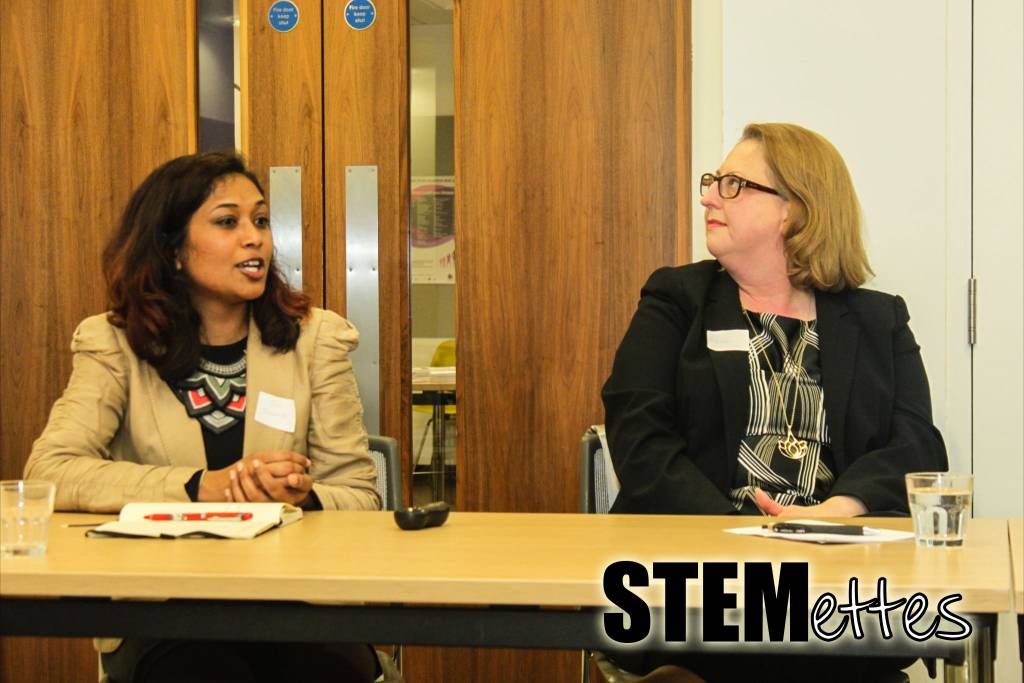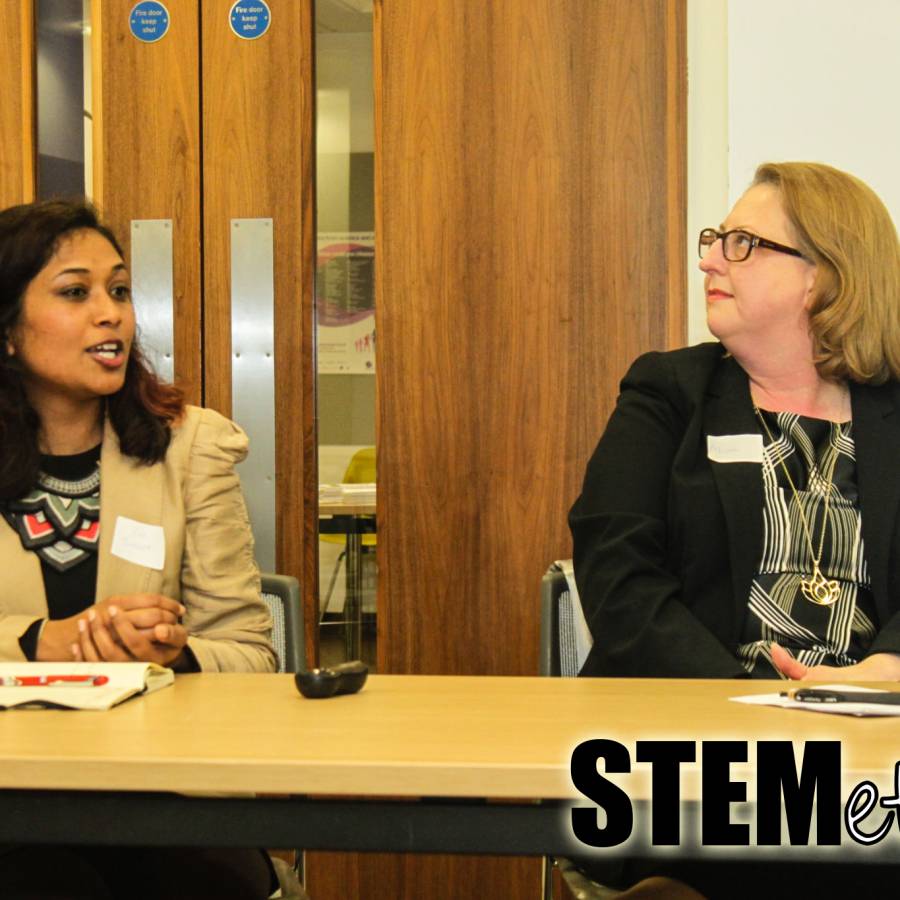On Thursday, the 8th of February, I had the privilege to participate in the Stemette panel with some very amazing ladies – with a long string of PhDs and contributions to the Large Hadron Collider (@suziesheehy and @m_windridge), others who are breaking ground in Energy (@JazRabadia) or can point to the Shard and say I made that (@selinapavan). At the same time, we were not shy to opt for high heels or acknowledge our mutual love of dancing or coding large numbers (@alisonleary1 and @neilcford) – OK, yes, Neil had the toughest task: he was standing in for 49% of the world’s population!
That is a long-winded way of saying that I felt dwarfed in the presence of all these accomplishments and awed that I had even been invited. To tell you a little about me, I am an Engineer. I specialised in Robotics through my education. I started off working in academia, designing robotic and satellite systems, mainly for ‘living off the land’ on the moon or Mars. I got very interested in looking for further applications of robotics using tools that were available to everyone and in turn, helping citizen science a real possibility. I attempted to bring robotics to the world of those who play LEGO and have internet access. I have set up my own company and also worked in commercial industries where e-commerce and the internet make the majority of sales to highly technical customers to try and understand how new ideas can make big technology adoption possible. I am still learning. I am still building the dream and working towards it. Being able to have a sound understanding of coding, a deep understanding of technology and a curious mind has enabled me to have very enriching experiences and a career I am proud of. But the best is yet to come.
Everyone on the panel was the same. We were not restricted by where we were born – four panellists (including @001_cassandra) were born outside the UK – today, what is important is being good at what you do. The panel brought forward a very interesting school of thought, which I summarise here:
- Look around. Yesterday’s divisions and boundaries are blurred or disappearing. Old and young, rural and urban, theory and practice, global and local…
- We all could see certain turning points in our lives where technology was changing – i.e. we can remember the internet starting to be more available, or social media networks like Facebook and Twitter emerging. You will have more and more of these milestone events that present an opportunity to be creative and innovative
- Several of us went into STEM due to interest and then could carve our niche to find where our talents and interests were best used.
- If you take a career path in science you will never live a day where you are bored of your work.
In the follow-up session, I met with several young students who had diverse interests – who had aspirations in Biology to those who wanted to start their businesses! Our efforts are not to ‘convert’ but simply to offer the facts about what we are currently seeing happen in technology and educate these young people on the possibilities.
A study carried out by Microsoft and Interactive Harris in the US threw some light on gender differences:
The inspiration for choosing STEM varied quite a bit between males and females.
- Male students were more likely to pursue STEM because they have always enjoyed playing with games and toys, reading books, and participating in clubs focused on their chosen subject areas (51 per cent versus 35 per cent of females).
- Female students were more likely to say they chose STEM to make a difference (49 per cent versus 34 per cent of males)
I decided to just flash some statistics in front of these young people about the trends of career opportunities in the last ten years and what are the key skills and expertise that are most sought after now. The next 10 years will bring a sea change and with basic technology understanding, interest and coding you will be able to succeed in whatever you choose to apply your talents to.

If you would like to learn to code: check out the hackathons (@neilcford and @001_Cassandra of @Freeformers_UK organise) or use these 10 online tools to learn the basics. If you like it, give Arduino and Raspberry Pi a try – these are hackable devices and will give you a great deal of flexibility in designing something that you can use in the home or the office. In doing so, ask for help and find others to work with that can share a little bit of your interest. And when you wonder why, just give these stats a look. @stemettes will also be bringing a hackathon to you in the Summer months, so watch this space!
by Bee Thakore – Engineer who serves as technology evangelist, marketer, coder and robotics specialist. Trustee of Space Education Trust and The Planetary Society – helping more young people get higher post-graduate space education and citizen science projects. Bee sat on our Women’s Day panel.






